Hiring Veterans For All The Right Reasons
Hiring veterans of America’s military services must be more than a noble stated company goal and plan to simply help a defined population find work. Like all Diversity and Inclusion initiatives, to be successful veteran hiring initiatives also must be built to strengthen the company, increase productivity and profits and to serve its clients and customers.
Simply hiring those identifying themselves as veterans will not predictably achieve these goals. But here is what we do know. Veterans have tremendous skills, training, scored and accessible performance and promotion histories, and are statistically more stable and loyal to their employers than the general population. And, if properly matched to your company’s needs, trained and integrated, they can and will offer your company tremendous focus, leadership and a desire to be part of a stable and supportive organization, as this is what they have lived and breathed for years.

Realize also that not all veterans are the same. Like the various groups that make up our society as a whole, each branch of the military is a distinct entity with its own missions, training, culture, and ways of approaching challenges and reacting to authority and establishing leadership. Consider this, an Air Force mechanic has great technical skills that apply to any manufacturing role requiring high mechanical aptitude and exacting standards. On the other hand, a Marine mechanic is trained and used to working in a far different environment where adapting and improvising is essential while under greater levels of stress. But if their machinery fails, it does not come crashing to the ground from 10,000 feet. A naval officer or Army logistics specialist faces other incredible challenges in moving critical manpower and supplies through a global organization, with plans that change not based on 10-year projections, but on critical world events and all too often disasters.
A fresh from duty service member facing the private sector for the first time is a far, far different person than a veteran who was in the Reserves, National Guard or has been out of service and working for many years. Think of it this way – If you had spent the past 8 years of your life as an active duty US Army Infantry member (The Army is the largest sector of the US Military) and were looking for your first private sector job, would you be smooth and conversational and relaxed and engaging when you sit in that first interview chair? Or would you have a rigid posture, square shoulders and almost shout “Yes Maam” or “No Sir” to every question posed? The reality is, most interviewers when faced with a veteran recently achieving terminal leave will find themselves very uncomfortable and not welcoming or understanding of the nature of how and why this Diversity Candidate is so very different from their normal interviewee. All too often, discomfort equates to not truly considering the person and what they bring to the table to benefit the company. And yes, each veteran IS A Minority.
Are your recruiters and hiring managers trained and prepared for the differences that they will surely face with a newly minted private citizen who served our nation with pride and commitment? Will your team have the access to the tools and be trained to read a resume that includes acronyms and terms that no one in your industry and with civilian experience face or use? In other words, will they understand what skills and experience or even a veteran’s ranking and grade level and what these mean in terms of their performance and specific transferable skills. If your answer is “No,”, or “I am not sure,” your initiative to hire and retain more veterans may be a great PR statement, but it likely is missing the structure to truly help your company find the right future leaders and performers from the vast veteran community to drive profits and more effectively engage with your diverse clients and customers.
My son Dan is a combat veteran of the US Marine Corps – Lance Corporal / 1st BN, 8th Marine Div. Since he departed military service, his training as a dog handler/infantry rifleman certainly has proven to have shaped who and what he is. But does fighting the Taliban really prepare him for professional success. Take a few minutes to think about that. Young men and women in combat roles may not have skills you understand or can envision as matching to your needs. What they do have is focus, loyalty, incredible team orientations, problem-solving abilities and a proven work ethic under stress that few can even imagine. Dan is now Pre-Med at The Ohio State University. In a few more years, he may be the person doing your dental surgery (His desired focus). Never underestimate the capabilities of a vet, but do understand and have the tools to understand that veteran. What they have done and accomplished and the challenges they faced are alien to most Americans in our insulated worlds.
The question you face as an HR professional or employers is “Will you be prepared for the mission of improving your veteran hiring and company performance by preparing, gathering all our tools, training and then practicing what it takes for this critical mission to succeed?” Or will you and your company just make the all too popular statement that you are a “Vet Friendly Employer,” but fail to prepare for true mission success?
Showing up is not enough. Our veterans want, need and deserve more from us. And if we do it well, we can and will be richly rewarded.
